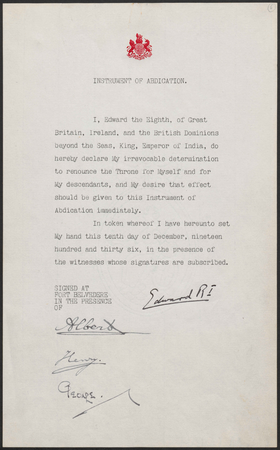Crown vs. Love: The Scandalous Abdication of King Edward VIII for Wallis Simpson
Share IT

Launch Your Dream Website with Us!
Click Here to Get in touch with Us.
Categories
King Edward VIII for Wallis Simpson
King Edward VIII of the United Kingdom abruptly decided to abdicate his throne on December 11, 1936, in order to wed Wallis Simpson, an American socialite. This extraordinary incident raised concerns about politics, religion, and the very essence of the monarchy, sending shockwaves throughout the British Empire and beyond.
Thank you for reading this post, don't forget to subscribe!Here’s a closer look at the main causes of this momentous occasion:
King Edward VIII for Wallis Simpson
Table of Contents
Edward’s Unusual Decision:
In 1936, Edward became king after his father, King George V, passed away. His reign was short-lived, though, as he fell madly in love with American socialite Wallis Simpson, who had already been divorced twice. Because of Wallis’ social background and marital status, the British establishment, including the government and the Church of England, considered this relationship unacceptable.
Crisis in the Constitution:
Edward was told by Prime Minister Stanley Baldwin that he could not wed Wallis and still be king. The opposition to the marriage came from the government, the Church, and the general public, who raised issues about the Queen’s role and the stability of the monarchy. Since Edward couldn’t seem to let go of Wallis, this led to a constitutional crisis.

The Resignation:
Edward was forced to make a difficult decision, and in the end he chose love over the crown. He announced his decision to abdicate in a radio speech to the country on December 11, 1936. He declared in his speech how much he loved Wallis and felt that he could not perform his royal duties without her at his side.
The Fallout:
The British monarchy entered a new era with Edward’s abdication. In 1952, his younger brother Prince Albert succeeded him as King George VI, and his daughter Queen Elizabeth II inherited the throne. Not long after the abdication, Edward and Wallis were married in France, but they were shunned for many years by the royal family.
Historical Importance:
In British history, Edward VIII’s abdication is still a pivotal moment. It emphasized how the monarchy is changing in a modernizing world and how the public’s relationship with the crown is changing. It also provoked discussions, even at the highest levels of society, about love, responsibility, and the freedom of the individual to follow their own path.
A More in-depth Look at King Edward VIII’s Abdication
In British history, King Edward VIII’s 1936 abdication is still regarded as one of the most important and contentious occasions. We must delve further into the background, driving forces, and effects of this momentous decision in order to completely comprehend its significance.

Context and Intentions:
Edward’s Nonconformist Attitudes: Prior to his elevation, Edward was well-known for leading an unconventional life. He favored a more contemporary, casual approach and detested the constraints of royal life.
Wallis Simpson: The main motivation for Edward’s abdication was his obsession with Wallis Simpson, an American socialite who had been divorced twice. She was the object of his intense love, and he saw her as necessary to his happiness.
Social and Political Opposition: The marriage was met with strong opposition from the British establishment. Because of its rigid views on divorce, the Church of England declined to recognize Wallis as Queen. Her social background and possible influence on the monarchy also caused the government and public opinion to express concerns.
Crisis in the Constitution and Abdication:
King Edward VIII for Wallis Simpson
Prime Minister Stanley Baldwin issued an ultimatum to Edward, stating that he had to decide between Wallis and the throne. Because of his intransigence in relinquishing Wallis, Edward created a constitutional crisis that jeopardized the monarchy’s stability.
The Radio Address: Edward announced his decision to abdicate in a radio address to the nation on December 11, 1936. He professed his love for Wallis in his impassioned speech, adding that he could not perform his job without her at his side.
Effect on the Crown: The British monarchy underwent a sea change after the abdication. It represented the crown’s waning absolute power and its increasing need to adjust to the social and political environments that were changing.
Repercussions and Enduring Legacy:
King Edward VIII for Wallis Simpson
Edward and Wallis: Following their marriage, Edward and Wallis experienced a life of social exclusion, losing their royal titles and being barred from attending important royal occasions. They continued to defy convention, though, and their relationship remained strong.
George VI and Queen Elizabeth II: Albert, Edward’s younger brother, became King George VI as a result of Edward’s abdication. Despite being sicker than anticipated, his reign set the stage for his daughter Queen Elizabeth II’s lengthy and prosperous rule.

Sustaining Discussion: Debate and discussion surrounding the abdication are still ongoing. While some consider Edward as a romantic hero who followed his heart, others disagree, calling his choice careless.Principal Subjects:
Duty vs. Love: Edward’s commitment to the country and the crown clashed with his desire for personal happiness. Discussions concerning personal responsibility, choice, and the sacrifices expected of a monarch were sparked by this central conflict.
Tradition vs. Modernity: The traditional expectations and norms of the British monarchy were questioned by Wallis’s status as a divorced American woman and Edward’s nontraditional lifestyle. This conflict brought to light how society is evolving and how the monarchy must change to reflect contemporary society.
Church and State: A major factor in the opposition to the marriage was the Church of England’s strong anti-divorce stance. This highlighted the intricate relationship between church and state, especially when it comes to issues concerning the throne.
Public Opinion and the Media: The general public had mixed feelings about the matter; some defended the monarchy’s sanctity while others backed Edward’s quest of love. The public’s perception and the path of events were greatly influenced by the media.
Constitutional Crisis: When Edward refused to decide between Wallis and the throne, a constitutional crisis was set off, endangering the monarchy’s stability and necessitating government intervention. This revealed the boundaries of the monarchy’s constitutional authority and the significance of preserving a harmony between custom and the changing political environment.
Principal Positions:
King Edward VIII for Wallis Simpson
The drama’s main character, King Edward VIII, must make the painful decision between duty and love. His choice to abdicate had a significant effect on British history and the monarchy.
Edward’s sweetheart Wallis Simpson was a contentious figure who sparked the abdication crisis due to her unusual upbringing and marital status.
Leading the government through the constitutional crisis and counseling Edward on his options is Prime Minister Stanley Baldwin. In serving as a mediator between the people, the government, and the king, his position was vital.
The Church of England: A significant organization whose views on divorce made it vehemently opposed to marriage. This position was crucial in forming public opinion and influencing the circumstances that led to the abdication.
The British Public: Opinions regarding Edward’s choice were split; some favored his love, while others placed more importance on the monarchy’s stability. In the end, public opinion contributed to the king’s pressure and shaped the government’s reaction.
These important subjects and roles draw attention to the intricate interactions between political factors, religious convictions, and popular opinion that resulted in King Edward VIII’s historic abdication. The incident was harmful to the monarchy and provides insight into how the monarchy developed and the difficulties it encountered in adjusting to a changing world.

Launch Your Dream Website with Us!
Click Here to Get in touch with Us.





























































Recent Comments